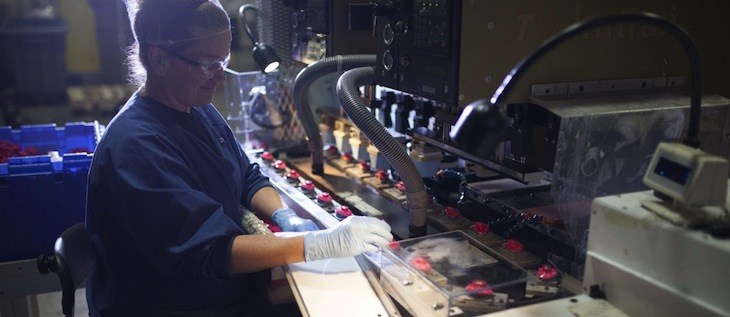Wal-Mart outlines policy roadmap to boost U.S. manufacturing
by July 27, 2017 1:20 pm 852 views

Four years into Wal-Mart’s mission to support U.S. manufacturing jobs, the retailer continues efforts to shape discussions at the national level between manufacturers, government and non-government organizations and other stakeholders.
Wal-Mart officials held a meeting Wednesday (July 26) with some of the stakeholders and presented guidelines and protocols that aim to support this complicated agenda.
“As we’ve worked over the last four years alongside our suppliers toward our goal to source an additional $250 billion in products that support American jobs, we’ve learned a great deal about the challenges our suppliers face in domestic manufacturing,” said Cindi Marsiglio, Wal-Mart vice president for U.S. Sourcing and Manufacturing. “The good news is we’ve also learned how to overcome the challenges and, because of our experience, Wal-Mart is uniquely positioned to help facilitate broad engagement in accelerating the expansion of U.S. manufacturing.”
Wal-Mart said the new policy roadmap identifies the highest impact policy barriers and proposed specific policies that have the potential to accelerate and grow U.S. manufacturing. The key barriers in Wal-Mart’s report include workforce, coordination and financing, regulation, and tax and trade and proposes specific policies.
The roadmap also details 10 policy actions to address barriers and suggests the appropriate entities – including federal, state, and local governments, manufacturers, and businesses – that must collaborate on policy actions to effect meaningful change that will unlock greater growth and job creation in domestic manufacturing of consumer goods.
Specific action items include:
• Allocate federal, state, and local funds for educational institutions, vocational schools, and training programs that are tailored for skill sets in high demand by local and regional manufacturers;
• Enhance economic development centers, foreign investment offices, and site selection support to more easily facilitate manufacturing capacity expansions;
• Create a more flexible compliance scale for small businesses regarding federal regulations originally designed for larger companies; and
• Consider lowering or repealing inventory taxes and other property taxes that are disincentives to investment in manufacturing activities.
Wal-Mart CEO Doug McMillon recently told suppliers the retailer is committed to the manufacturing agenda and will use its influence to enact or change policy as it pertains to facilitating U.S. manufacturing. He hinted that the retailer would work to bring stakeholders together in key areas identified as hurdles.
State governors have been key in Wal-Mart’s mission to see more manufacturing reshored because it’s often government that can help provide financial incentives and help locate sites and support workforce training. Recently Arkansas Gov. Asa Hutchinson spoke at the retailer’s Open Call for U.S. suppliers held in Bentonville. He has been ally of Wal-Mart’s U.S. manufacturing agenda and has worked to recruit any manufacturer wanting to locate or expand in the Natural State – such as the expansion of Pernod Ricard in Fort Smith which was announced last year.
“One of my chief priorities is ensure that all Arkansans have access to quality employment opportunities,” Hutchinson said Wednesday during the retailer’s meeting. “The best way to achieve that is to create an environment that encourages companies to invest and create jobs right here at home. Wal-Mart’s efforts to remove the hurdles that keep many companies from producing goods domestically by combining the forces of government, the private sector and non-governmental organizations, is a great step forward in tackling this complex issue.”
The Boston Consulting Group has been a leading advocate for Wal-Mart’s U.S. manufacturing agenda. BCG’s analysis estimates a potential to recapture about $300 billion in consumer goods that are now being imported. The categories include furniture, cookware and sporting goods. BCG also said if this manufacturing is onshored it will support 1.5 million American jobs. Critics have said the jobs estimate is too high given so much of manufacturing today is automated.
Harry Moser, founder of Reshoring Initiative, reported in May for the first time in decades, more manufacturing jobs are returning to the United States than are going offshore. The combined reshoring and foreign direct investment (FDI) trends grew by over 10% in 2016, adding 77,000 jobs, tying the 2014 record and exceeding the rate of offshoring by about 27,000 jobs. The 2016 results bring the total number of manufacturing jobs brought back from offshore to more than 338,000 since the manufacturing employment low of February 2010.
“We publish this data annually to show companies that their peers are successfully reshoring and that they should reevaluate their sourcing and siting decisions,” Moser said. “With 3 to 4 million manufacturing jobs still offshore, as measured by our $500 billion/year trade deficit, there is potential for much more growth. We call on the administration and Congress to enact policy changes to make the United States competitive again. Our Competitiveness Toolkit is available for them to quantify the impact of policy alternatives, including: stronger skilled workforce; lower corporate taxes and regulations; and lower U.S. dollar.”
According to data from its suppliers, approximately two-thirds of Walmart U.S. merchandise spending is for items that are made, assembled, sourced, or grown in the U.S. Much of that is food given Wal-Mart is the nation’s largest grocery chain. Wal-Mart is still the largest importer of goods for sale in the country based on the number of containers making the trip from China and Asia to U.S. ports.
“It’s important to note that there is no silver bullet that will solve the problem on its own. The barriers to domestic manufacturing are just too broad and too complex,” said Dustin Burke, a partner in BCG’s manufacturing practice.
Link here for a PDF of the policy roadmap.
